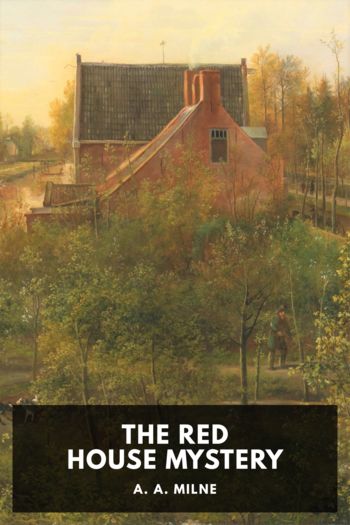Short Fiction Edgar Allan Poe (books for men to read .txt) 📖

- Author: Edgar Allan Poe
Book online «Short Fiction Edgar Allan Poe (books for men to read .txt) 📖». Author Edgar Allan Poe
Unable to discover its legitimate object, the popular fury at length subsided; leaving behind it, by way of sediment, quite a medley of opinion about this unhappy affair.
One gentleman thought the whole an X-ellent joke.
Another said that, indeed, Bullet-head had shown much X-uberance of fancy.
A third admitted him X-entric, but no more.
A fourth could only suppose it the Yankee’s design to X-press, in a general way, his X-asperation.
“Say, rather, to set an X-ample to posterity,” suggested a fifth.
That Bullet-head had been driven to an extremity, was clear to all; and in fact, since that editor could not be found, there was some talk about lynching the other one.
The more common conclusion, however, was that the affair was, simply, X-traordinary and in-X-plicable. Even the town mathematician confessed that he could make nothing of so dark a problem. X, everybody knew, was an unknown quantity; but in this case (as he properly observed), there was an unknown quantity of X.
The opinion of Bob, the devil (who kept dark about his having “X-ed the paragrab”), did not meet with so much attention as I think it deserved, although it was very openly and very fearlessly expressed. He said that, for his part, he had no doubt about the matter at all, that it was a clear case, that Mr. Bullet-head “never could be persuaded fur to drink like other folks, but vas continually a-svigging o’ that ere blessed XXX ale, and as a naiteral consekvence, it just puffed him up savage, and made him X (cross) in the X-treme.”
Landor’s Cottage A Pendant to “The Domain of Arnheim”During a pedestrian trip last summer, through one or two of the river counties of New York, I found myself, as the day declined, somewhat embarrassed about the road I was pursuing. The land undulated very remarkably; and my path, for the last hour, had wound about and about so confusedly, in its effort to keep in the valleys, that I no longer knew in what direction lay the sweet village of B⸺, where I had determined to stop for the night. The sun had scarcely shone—strictly speaking—during the day, which nevertheless, had been unpleasantly warm. A smoky mist, resembling that of the Indian summer, enveloped all things, and of course, added to my uncertainty. Not that I cared much about the matter. If I did not hit upon the village before sunset, or even before dark, it was more than possible that a little Dutch farmhouse, or something of that kind, would soon make its appearance—although, in fact, the neighborhood (perhaps on account of being more picturesque than fertile) was very sparsely inhabited. At all events, with my knapsack for a pillow, and my hound as a sentry, a bivouac in the open air was just the thing which would have amused me. I sauntered on, therefore, quite at ease—Ponto taking charge of my gun—until at length, just as I had begun to consider whether the numerous little glades that led hither and thither, were intended to be paths at all, I was conducted by one of them into an unquestionable carriage track. There could be no mistaking it. The traces of light wheels were evident; and although the tall shrubberies and overgrown undergrowth met overhead, there was no obstruction whatever below, even to the passage of a Virginian mountain wagon—the most aspiring vehicle, I take it, of its kind. The road, however, except in being open through the wood—if wood be not too weighty a name for such an assemblage of light trees—and except in the particulars of evident wheel-tracks—bore no resemblance to any road I had before seen. The tracks of which I speak were but faintly perceptible—having been impressed upon the firm, yet pleasantly moist surface of—what looked more like green Genoese velvet than anything else. It was grass, clearly—but grass such as we seldom see out of England—so short, so thick, so even, and so vivid in color. Not a single impediment lay in the wheel-route—not even a chip or dead twig. The stones that once obstructed the way had been carefully placed—not thrown—along the sides of the lane, so as to define its boundaries at bottom with a kind of half-precise, half-negligent, and wholly picturesque definition. Clumps of wild flowers grew everywhere, luxuriantly, in the interspaces.
What to make of all this, of course I knew not. Here was art undoubtedly—that did not surprise me—all roads, in the ordinary sense, are works of art; nor can I say that there was much to wonder at in the mere excess of art manifested; all that seemed to have been done, might have been done here—with such natural “capabilities” (as they have it in the books on Landscape Gardening)—with very little labor and expense. No; it was not the amount but the character of the art which caused me to take a seat on one of the blossomy stones and gaze up and down this fairy-like avenue for half an hour or more in bewildered admiration. One thing became more and more evident the longer I gazed: an artist, and one with a most scrupulous eye for form, had superintended all these arrangements. The greatest care had been taken to preserve a due medium between the neat and graceful on the one hand, and the pittoresque, in the true sense of the Italian term, on the other. There were few straight, and no long uninterrupted lines. The same effect of curvature or of color appeared twice, usually, but not oftener, at any one point of view. Everywhere was





Comments (0)